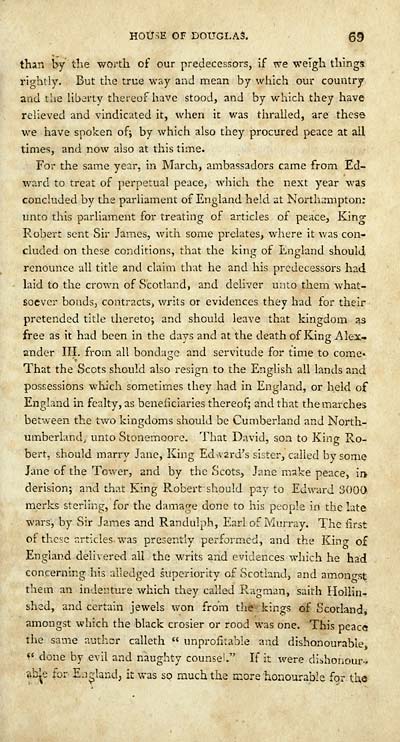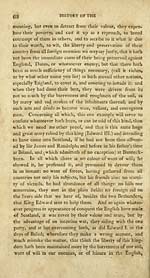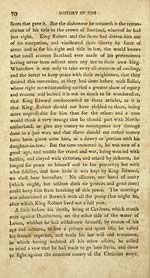History of the house and race of Douglas and Angus
(97) Page 69
Download files
Complete book:
Individual page:
Thumbnail gallery: Grid view | List view

HOt^E OF DOUGLAS. 69
than by the worth of our predecessors, if we weigh things
rightly. But the true way and mean by which our country
and the liberty thereof have stood, and by which they have
relieved and vindicated it, when it was thralled, are these
we have spoken of; by which also they procured peace at all
times, and now also at this time.
For the same year, in March, ambassadors came from Ed-
ward to treat of perpetual peace, which the next year was
concluded by the parliament of England held at Northampton:
unto this parliament for treating of articles of peace, King
Robert sent Sir James, with some prelates, where it was con-
cluded on these conditions, that the king of England should
renounce all title and claim that he and his predecessors had
laid to the crown of Scotland, and deliver unto them what-
soever bonds, contracts, writs or evidences they had for their
pretended title thereto; and should leave that kingdom as
free as it had been in the days and at the death of King Alex-
ander III. from all bondage and servitude for time to come*
That the Scots should also resign to the English all lands and
possessions which sometimes they had in England, or held of
England in fealty, as beneficiaries thereof; and that the marches
between the two kingdoms should be Cumberland and North-
umberland, unto Stonemoore. That David, son to King Ro-
bert, should marry Jane, King Edward's sister, called by some
Jane of the Tower, and by the Scots, Jane make peace, irk
derision; and that King Robert should pay to Edward 3000
merks sterling, for the damage done to his people in the late
wars, by Sir James and Randulph, Earl of Murray. The first
of these articles, was presently performed, and the King of
England delivered all the writs and evidences which he had
concerning his alledged superiority of Scotland, and amongst
them an indenture which they called Ragman, saith Hollin-
shed, and certain jewels won from the- kings of Scotland,
amongst which the black crosier or rood was one. This peace
the same author calleth " unprofitable and dishonourable,
«< done by evil and naughty counsel." If it were dishonour-
ai^e for England, it was so much the more honourable for the
than by the worth of our predecessors, if we weigh things
rightly. But the true way and mean by which our country
and the liberty thereof have stood, and by which they have
relieved and vindicated it, when it was thralled, are these
we have spoken of; by which also they procured peace at all
times, and now also at this time.
For the same year, in March, ambassadors came from Ed-
ward to treat of perpetual peace, which the next year was
concluded by the parliament of England held at Northampton:
unto this parliament for treating of articles of peace, King
Robert sent Sir James, with some prelates, where it was con-
cluded on these conditions, that the king of England should
renounce all title and claim that he and his predecessors had
laid to the crown of Scotland, and deliver unto them what-
soever bonds, contracts, writs or evidences they had for their
pretended title thereto; and should leave that kingdom as
free as it had been in the days and at the death of King Alex-
ander III. from all bondage and servitude for time to come*
That the Scots should also resign to the English all lands and
possessions which sometimes they had in England, or held of
England in fealty, as beneficiaries thereof; and that the marches
between the two kingdoms should be Cumberland and North-
umberland, unto Stonemoore. That David, son to King Ro-
bert, should marry Jane, King Edward's sister, called by some
Jane of the Tower, and by the Scots, Jane make peace, irk
derision; and that King Robert should pay to Edward 3000
merks sterling, for the damage done to his people in the late
wars, by Sir James and Randulph, Earl of Murray. The first
of these articles, was presently performed, and the King of
England delivered all the writs and evidences which he had
concerning his alledged superiority of Scotland, and amongst
them an indenture which they called Ragman, saith Hollin-
shed, and certain jewels won from the- kings of Scotland,
amongst which the black crosier or rood was one. This peace
the same author calleth " unprofitable and dishonourable,
«< done by evil and naughty counsel." If it were dishonour-
ai^e for England, it was so much the more honourable for the
Set display mode to:
![]() Universal Viewer |
Universal Viewer | ![]() Mirador |
Large image | Transcription
Mirador |
Large image | Transcription
Images and transcriptions on this page, including medium image downloads, may be used under the Creative Commons Attribution 4.0 International Licence unless otherwise stated. ![]()
| Histories of Scottish families > History of the house and race of Douglas and Angus > (97) Page 69 |
|---|
| Permanent URL | https://digital.nls.uk/94874778 |
|---|
| Description | A selection of almost 400 printed items relating to the history of Scottish families, mostly dating from the 19th and early 20th centuries. Includes memoirs, genealogies and clan histories, with a few produced by emigrant families. The earliest family history goes back to AD 916. |
|---|

